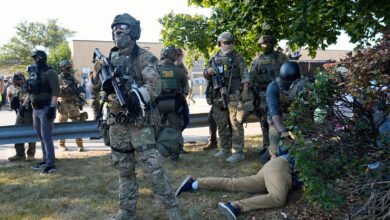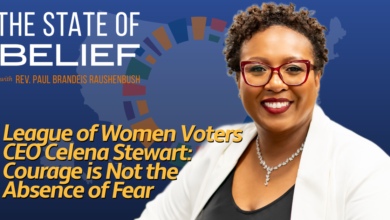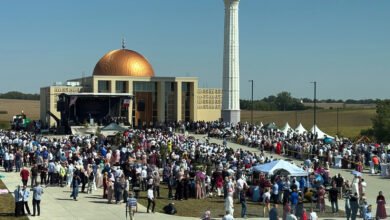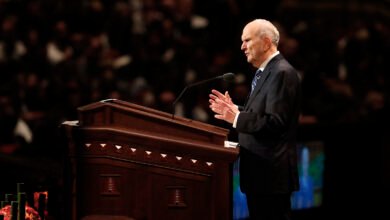After Boulder attack, American Jews are afraid

(RNS) — City leaders lit the iconic Boulder Star on Colorado’s Flagstaff Mountain on Monday (June 2) to honor the Jewish community and those injured a day earlier in a Molotov cocktail assault on demonstrators marching in support of Israeli hostages.
A vigil titled Coming Together is planned for Wednesday at the Jewish Community Center. And the Boulder Jewish Festival, planned for Sunday, will go on.
But Boulder Jews are feeling terrified after the incident in which a man shouting “free Palestine” hurled Molotov cocktails at a group of mostly Jewish demonstrators. The group gathers weekly outside the Boulder County Courthouse to support awareness of Israeli hostages still held in Gaza by Hamas. Twelve people were injured; eight were hospitalized with burns. At least two were flown to a nearby burn unit.
How many show up to these and other events — and how many will feel reassured by efforts in their community to come together and heal — remains to be seen. American Jewish leaders say they are alarmed by a resurgence of violent antisemitism. And they are afraid.
“We’re seeing this as a wake-up call, even more than a call, a tsunami, perhaps, a watershed moment in Jewish history that we were not expecting,” said Rabbi Boaz Heilman of Congregation B’nai Torah, a Reform synagogue in Westminister, Colorado, about 20 miles south of Boulder. “We are all very concerned, both for our safety and for our identity.”
American Jews point not only to the attack on Sunday but to the killing last month of two young Israeli Embassy aides in Washington, D.C., and the April firebombing of the governor’s mansion in Harrisburg, Pennsylvania, where Gov. Josh Shapiro and his family were celebrating Passover.
Rabbi Jamie Korngold, who heads a synagogue called Adventure Rabbi based in Boulder but meeting mostly outdoors, said she feels that antisemitism, particularly on the left, has skyrocketed in the last few years and that hatred of Jews has become normalized.
“We live in a place where we are hated by the extreme right. And the liberals who we thought were our allies have created this whole narrative, an inaccurate narrative about colonialism, about genocide, that is historically inaccurate, but that doesn’t matter,” she said, referring to critics of Israel’s war in Gaza.
There are about 13,000 Jews living in Boulder, second only to Denver in Colorado, according to a 2019 study. There are about seven congregations in the city itself and several others nearby.
The Boulder group Run for Their Lives has been holding demonstrations regularly, sometimes weekly, since the terrorist attack by Hamas on Israel on Oct.7, 2023. Several of those injured in Sunday’s demonstration affiliate with Congregation Bonai Shalom, a Conservative synagogue.
The man accused of Sunday’s assault is Mohamed Sabry Soliman, an Egyptian immigrant who arrived on a tourist visa before applying for asylum. His asylum case was pending. Soliman told authorities that “he wanted to kill all Zionist people and wished they were all dead.”
He now faces a federal hate crime charge and state charges of attempted murder.
On Tuesday, the State Department arrested Soliman’s wife and five children and revoked their visas.
RELATED: What we know about the suspect and victims in the Boulder, Colorado, attack
Those who monitor and study antisemitism say it’s important not to panic or to politicize the situation.
One thing is obvious, said Jonathan Jacoby, national director of the Nexus Project, an organization that fights antisemitism while protecting democratic freedoms.
“There’s a correlation between the violence in Gaza and the violence against Jews,” Jacoby said.
Whenever Israel engages in major military operations that incur significant Palestinian casualties— over 56,000 people have been reported killed in Israel’s assault on Gaza — it results in surges of antisemitic incidents and hate crimes against Jews, he said.
Jacoby said he hoped the incident would not lead to a politicization of antisemitism, such as clamping down on free speech against those criticizing Israel or going after university funding.
The most appropriate immediate response, Jacoby said, is for the government to help protect American Jews by funding the Nonprofit Security Grant Program, which provides funding for security enhancements for nonprofit organizations, such as synagogues and community spaces, that are at high risk of terrorist attacks.
A group of lawmakers put forward their highest-ever request for NSGP funding, asking for $500 million for the program in fiscal 2026. But President Donald Trump’s budget request to Congress recommended that the program remain at its current level of $274.5 million.
Beefed-up funding for security is critical for people who may be afraid to attend any gathering of Jews in the wake of attacks such as the one in Boulder.
“We’re trying to reassure people that they can safely participate in Jewish community,” Korngold said. “Some will come out for stuff, and some of them, they get spooked easily and not surprisingly.”
It may take some time for them to reengage with the Jewish community publicly.
“People who spend their lives in the United States, for the most part, did not feel threatened as Jews,” said Hadar Susskind, president and CEO of the New Jewish Narrative, a dovish group that pushes for peace and equality in Israel. “Now, everybody I know does, and that’s across political differences, that’s across geographic differences.I’m out there doing different things, and I’m not going to stop doing that, but I definitely think about it differently than I did before.”
RELATED: After Boulder and DC: Do we need a new Judaism?




